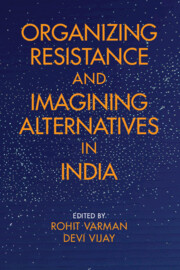Book contents
3 - Democratic Socialism: A Challenge to Sectarian Plutocracy
Published online by Cambridge University Press: 30 June 2022
Summary
A common theme in the explanations of the mass support for authoritarianism and sectarianism (often interlinked) across the world is an unintended consequence of the entrenching of economic inequalities created by neoliberal capitalism (Brown, 2019; Jackson and Grusky, 2017; Pierson, 2017). Resentments of those left out, this dominant explanation for rising sectarianism holds, was channelled by proto-fascist authoritarians to implicate all constituencies identified with democratic institutions and associated values like pluralism as unworthy and to be discarded (Frank, 2004; Mounk, 2018, Hacker and Pierson, 2020). Nativism was ‘not neoliberalism's intended spawn, but its Frankensteinian creation’ (Brown, 2019: 9).
The rise of sectarianism in India – Hindutva (Hindu supremacy) – has a different trajectory due to its early entanglement with traditional social hierarchies and the economic elite (Jodhka, 2016; Joshi and Malghan, 2017). The rise of Indian sectarianism to its now hegemonic status is due to the twin benefits it offers the indigenous plutocracy: a claim to cultural supremacy and the reinforcing of its economic interests (Chatterji, Hansen, and Jaffrelot, 2019; Palshikar, 2017). Support for Hindutva rises ‘as we go up the class hierarchy, as well as the caste hierarchy’ (Sridharan, 2014: 75, described later). It has been supported by the neoliberal state, even prior to its current transformation, through collaboration with Indian plutocrats to oppress challenges to its economic interests (Randeria, 2007; Sundar, 2010). Now with wealth extraction and display serving as evidence of religious supremacy, the sectarian state protects economic interests with an added religious zeal. The electoral successes of the collusion between big businesses and sectarian forces have intensified the state-led oppressions on behalf of plutocrats (Poruthiyil, 2019).
Resistance to sectarian plutocracy in India is being led by human rights groups like the Human Rights Watch, Amnesty International, and a number of Indian civil society groups such as the People's Union of Civil Liberties (PUCL). The focus of these organizations has been on the escalation in violence against weaker groups by majorities (like the spike in the lynching of Muslims), the destruction of democratic institutions such as the politicization of the judiciary, attacks on freedom of expression, unfair incarceration of dissenters, and the blatant favouring of corporate interests (Amnesty International, 2018; Human Rights Watch, 2019; Mander, Badhwar and Dayal, 2018; PUCL, 2021a, 2021b). Human rights activism tends to focus on egregious violations that trigger outrage while rarely addressing processes that widen material inequalities and benefit plutocrats.
- Type
- Chapter
- Information
- Publisher: Cambridge University PressPrint publication year: 2022



